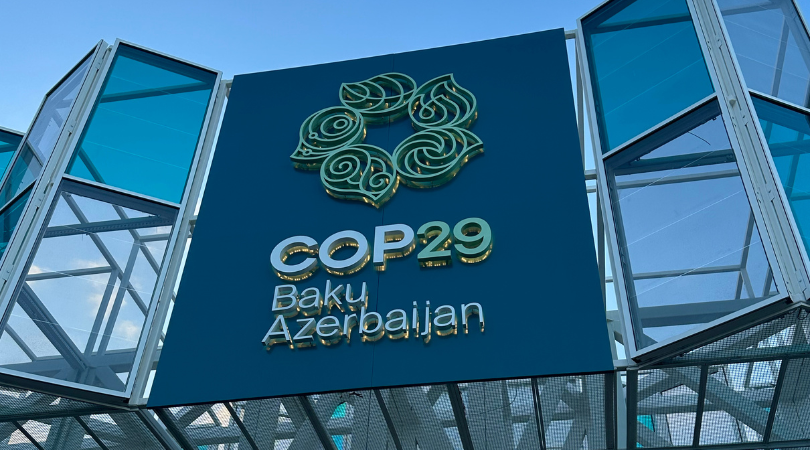Georgetown Students Experience Global Climate Action at COP29
Students from Georgetown University’s School of Foreign Service (SFS) recently had the extraordinary opportunity to attend the 29th Conference of the Parties (COP29) in Baku, Azerbaijan, where global leaders and climate experts gathered to tackle the urgent challenges posed by climate change.
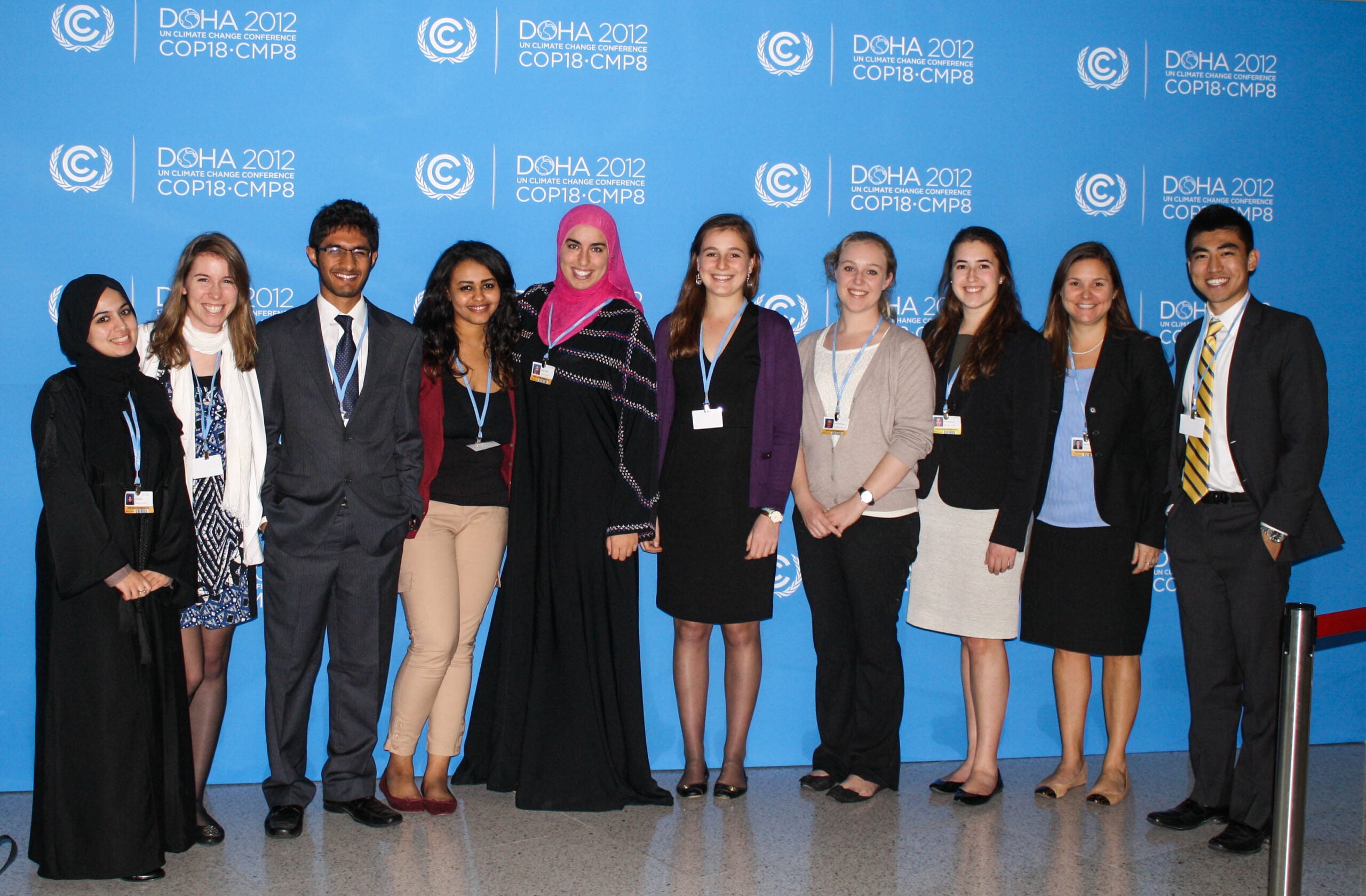
Dr. Lewis at COP18 with a delegation of Georgetown students.
Since 2009, Joanna Lewis, Georgetown University’s Provost’s Distinguished Associate Professor and Director of the Science, Technology and International Affairs (STIA) program, has led a delegation of students to COP annually. This year, the Master of Science in the School of Foreign Service (MSFS) and Environment and International Affairs (EIA) programs generously donated funds to cover the cost of student attendance. Learn more about Georgetown’s commitment to taking a student delegation to COP each year HERE .
This experience has been invaluable in providing students with direct exposure to the intricacies of international climate negotiations and policy-making processes, equipping them with the knowledge and skills to contribute to global environmental solutions. This year’s COP emphasized climate financing, with debates centering on scaling up funds to help vulnerable nations mitigate and adapt to climate change.
Anna Spear
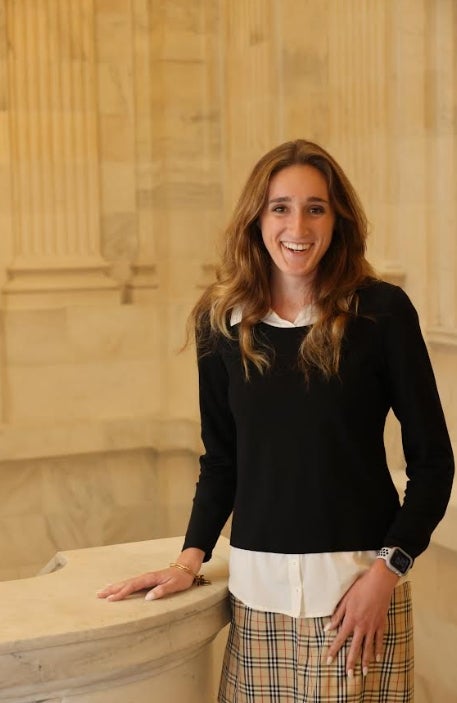
Anna Spear (MS-EIA’25) pictured.
Transformative – A Firsthand Experience in Global Climate Diplomacy
For Anna Spear (MS-EIA’25), a student in the Walsh School of Foreign Service with a concentration in Environment and International Affairs, attending COP29 was a transformative experience.
Having worked in Geneva with an NGO contracted by the United Nations, she honed her skills in translating complex scientific research into actionable policy recommendations. Her work focused on decarbonizing road transport, crafting pathways to net zero for industries like trucking and taxis and presenting these insights to the UN in preparation for COP conferences.
Anna’s journey to COP29 began with her passion for bridging the gap between science and policy. The desire to translating complex science into actionable policy motivated her join her program and attend COP. Attending COP29 was a dream come true. “I’d always wanted to go,” she shared. “Sitting in on the UN meetings, witnessing agenda-setting firsthand, and seeing the transitions between COP years was incredible.”
One of Anna’s most memorable moments at the conference was attending the Heads of State opening statements. “Hearing narratives from countries around the world—was fascinating. It was inspiring to see how each nation articulated their priorities and geared up for negotiations,” she explained.
“It was like a first-person testimony to what that country is experiencing and what they need. Also, just a great reminder as to why we were there and why national climate policy and action is so important. […] It connected the dots between my studies and the real-world impact of these efforts.”
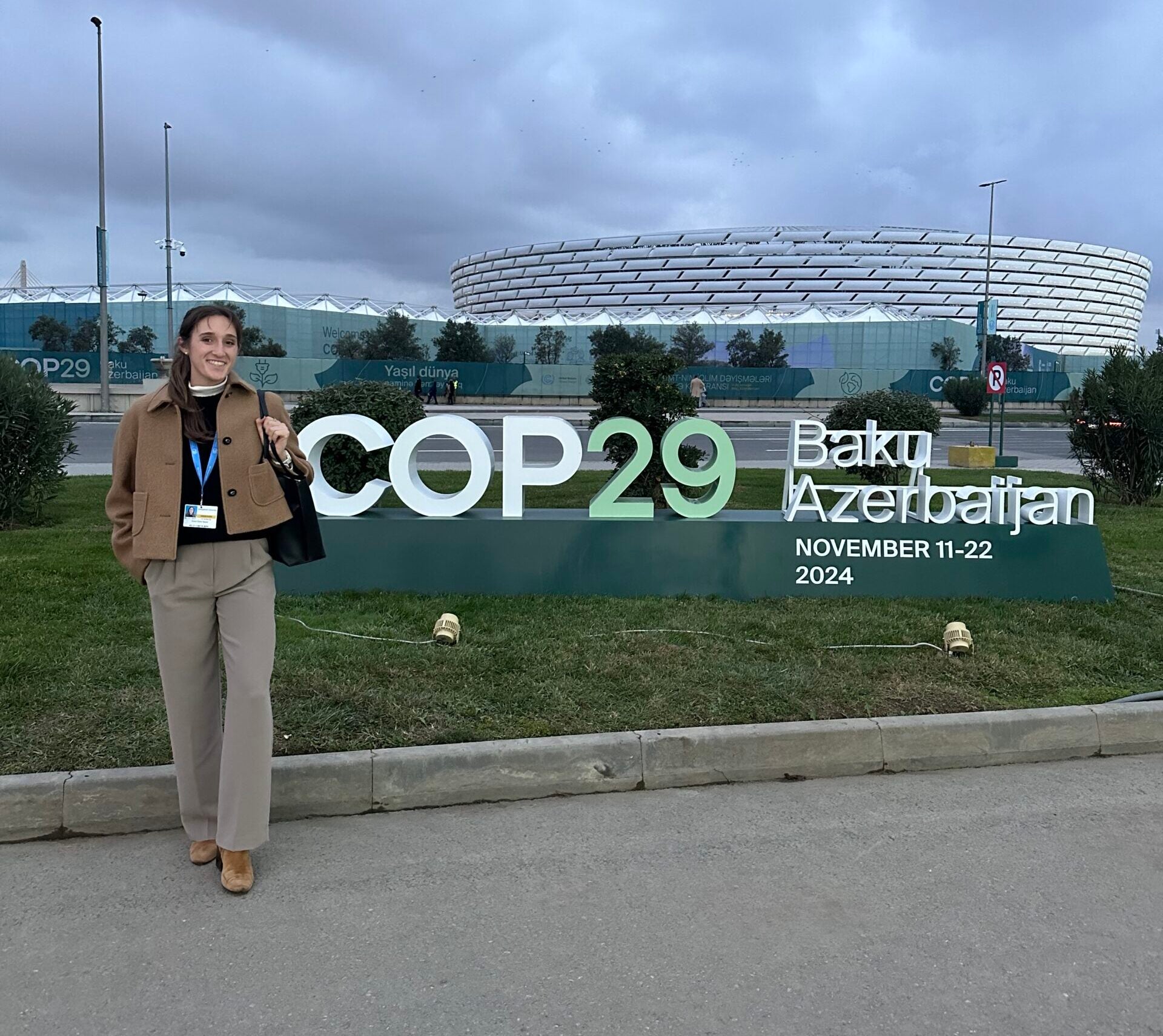
Anna Spear (MS-EIA’25) pictured with the COP29 banner.
Broadened Perspectives and Key Lessons
This year’s COP emphasized climate financing, and Anna stated, “It almost felt like there were two opposing sides. But I think despite that, there was still this sense of hope and cooperation because while different parties had different goals, they ultimately were fighting for the same thing.”
“When you get to see it firsthand, it becomes more real and it becomes more tangible. It’s different when you see the people behind the process, you know. It made it much more personal and personable. […] It felt way more real and honestly made me feel like I could make more of an impact.”
Reflecting on her time in Azerbaijan, Anna expressed profound gratitude for the opportunity to represent Georgetown at such a pivotal event. “It was an incredible experience—not just for the conference but for the cultural immersion and the chance to collaborate and learn.” she shared.
Anna’s journey highlights the transformative power of combining academic learning with real-world engagement, equipping Georgetown students to drive meaningful global change.
Zach Slotkin
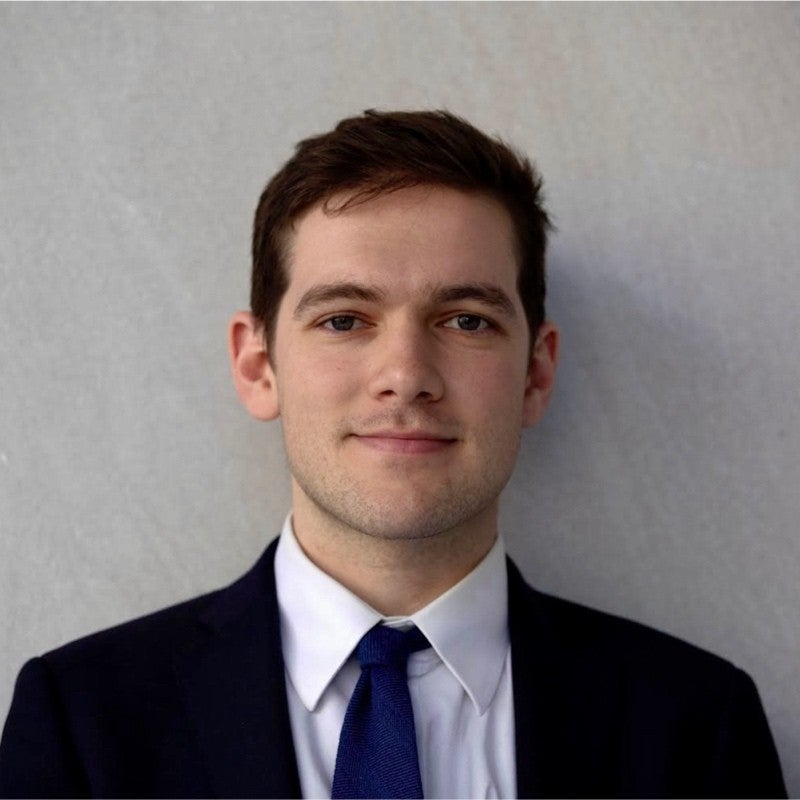
Zach Slotkin (MSFS’25) pictured.
A Comprehensive Experience – Policy to Practice
For Zach Slotkin (MSFS’25), a student in the Walsh School of Foreign Service with a concentration in Science, Technology, and International Affairs (STIA), attending COP29 in Baku was a pivotal experience that merged his academic pursuits with firsthand exposure to global climate negotiations.
Zach’s interest in climate diplomacy started before his time at Georgetown, when he worked at the Environmental Protection Agency (EPA). “I learned about the United States’ role in facilitating global climate agreements and the importance of the annual climate conventions in assessing global progress,” he explained. When Zach discovered that Georgetown sends delegations to COP, he was immediately drawn to the opportunity: “It was something I really wanted to pursue. It related to so many topics discussed in my classes, and I saw it as a chance to directly translate what I was learning into international negotiations.”
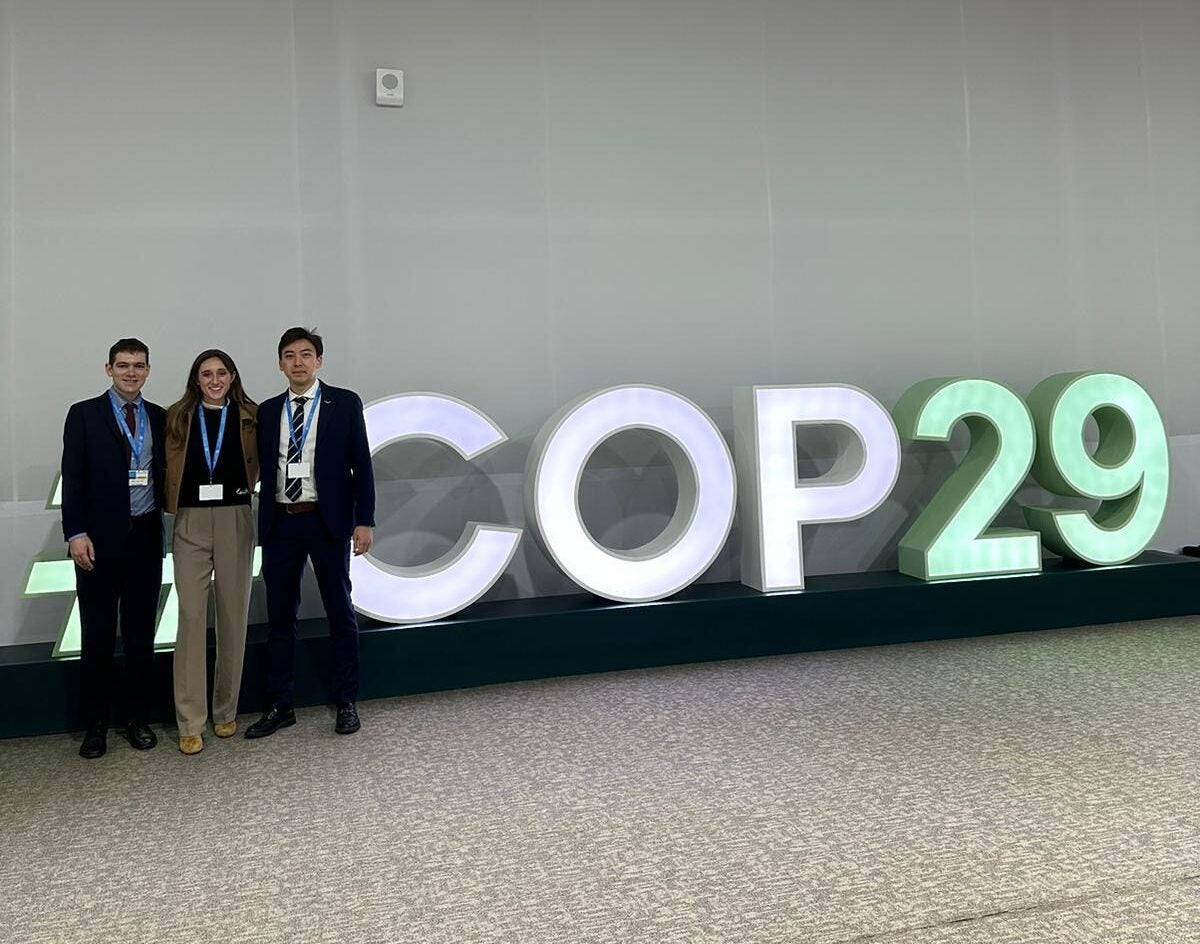
Zach Slotkin (MSFS’25), Anna Spear (MS-EIA’25) and Kamal Aubakirov (MSFS’25) pictured in front of the COP29 banner.
Learning from Leaders
One standout moment for Zach was attending a session featuring White House Climate Policy Advisor Ali Zaidi. “He provided reassurances that climate and energy will remain a priority, regardless of who sits in the Oval Office,” Zach recalled. “As someone interested in a career in federal government, it was valuable to learn about the career paths involved in U.S. climate diplomacy and get insights into the future of this work.”
Zach also attended a closed-door briefing with John Podesta, head of the U.S. delegation. “It was fascinating to hear about behind-the-scenes` dynamics and non-public aspects of the negotiations,” he shared. “That experience gave me a much deeper understanding of the strategies and adaptations involved in these talks.”
A recurring theme at the conference was the bipartisan nature of clean energy and climate initiatives. “Members of the U.S. delegation emphasized the importance of increasing clean energy manufacturing to stay globally competitive,” Zach noted. “It’s a bipartisan issue, with support from both sides of the aisle.”
Inclusivity is Key
Reflecting on his time at COP29, Zach underscored the importance of inclusivity in global climate diplomacy. “There’s a role for everyone—Democrats, Republicans, NGOs, the private sector, and both developed and developing countries,” he said. “Developing countries are disproportionately impacted by climate change, but their cooperation is essential for achieving meaningful goals.” He emphasized that in order to enact meaningful and inclusive climate policy everybody needs to have a seat at the table.
For Zach, COP29 was more than an academic exercise—it was an opportunity to witness international climate diplomacy in action and connect his studies to the real-world challenges, opportunities of global climate negotiations and the importance of collaboration.
Kamal Aubakirov
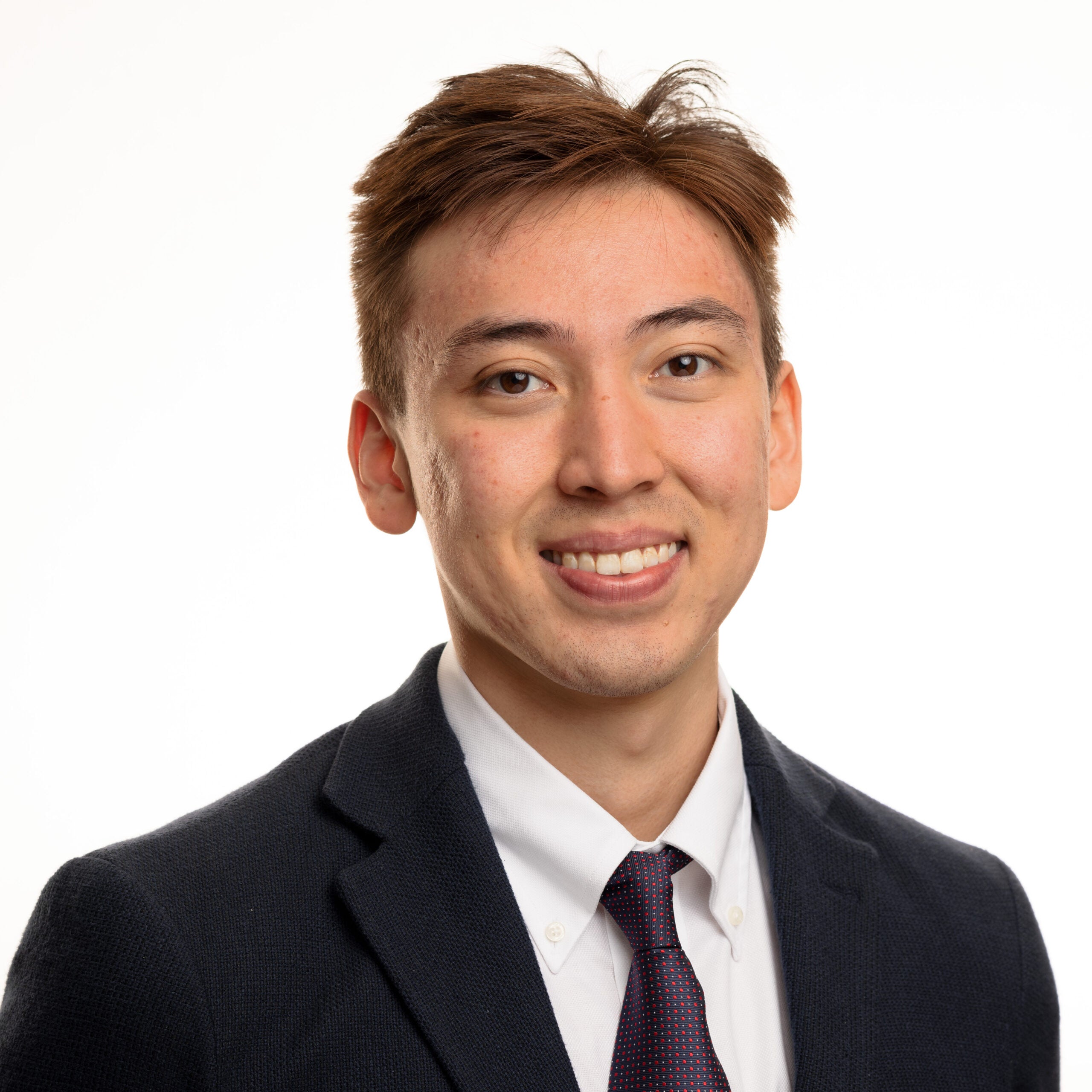
Kamal Aubakirov (MSFS’25) pictured.
Excitement – Tackling Global Climate Challenges
Kamal Aubakirov (MSFS’25), a student in the Walsh School of Foreign Service with a concentration in Science, Technology, and International Affairs (STIA), is no stranger to complex global challenges. Originally from Kazakhstan, Kamal worked in the mining of rare earth minerals before pursuing his graduate studies.
While at COP29 Kamal continuously was able to draw parallels between his coursework at Georgetown and the real-life implications of climate negotiations in Baku. “The first class that I took that relates to this was Climate Change and International Security” he said. “That’s when I was first introduced to how climate change can really affect how countries interact with each other in terms of security.”
Navigating Tough Terrain
Attending COP was both eye-opening and challenging. Kamal recalled the tense moments that underscored the difficulty of reaching consensus on climate issues. “Even on the first day, they couldn’t start the plenary session until late evening because they couldn’t agree on the agenda,” he shared. “This was the first signal where you actually see how difficult it is for people to negotiate. It’s really difficult to agree on something, especially when it comes to money.”
The finance-focused COP sought commitments to quantifiable climate goals. “The expectation was to get to around $1.3 trillion,” Kamal shared, “but they agreed on $300 billion, which a lot of developing countries are obviously not happy about.” Kamal also highlighted the complexities surrounding the issue of financial commitments. “It’s really hard to factor in all the historical responsibilities. Each region has their own set of arguments, and especially when it comes to money, that’s taxpayers’ money.”
Despite the tensions, Kamal found inspiration in the dedication of junior diplomats. “It’s encouraging to see how much they actually understand what needs to be done,” he noted. “They do all the groundwork for the high-level people to actually bring it into the space.”
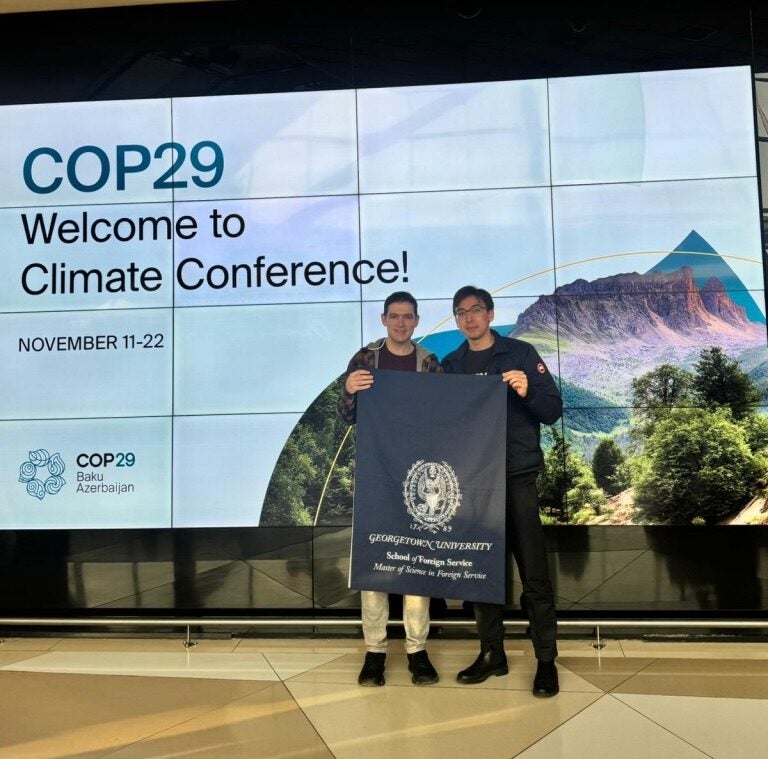
Zack Slotkin (MSFS’25) and Kamal Aubakirov (MSFS’25) pictured holding a Georgetown University banner in front of a COP29 welcome sign.
Tools for Growth
One of the highlights for Kamal was witnessing the high-level opening statements. “We went to the U.S. Center and saw John Podesta give a briefing,” he recalled. “For me, the most personal moment was seeing my own president [President of Kazakhstan, Kassym-Jomart Tokayevdeliver] his speech. He went first, and that was really cool to see, and watching his entourage navigate the space was fascinating.”
Looking back, Kamal emphasized the importance of collaboration and understanding in tackling global challenges. “You really need to understand the context of different regions and countries where they come from,” he said. “It’s the interpersonal relationships between negotiators that help push for what’s needed.”
Kamal’s ultimate goal is to work in climate finance with development banks, leveraging the knowledge and experiences he’s gained to make a tangible impact. “At the end of the day,” he concluded, “it’s about enabling yourself with more tools and experiences to give back to the planet.”
COP29 Wrap-up

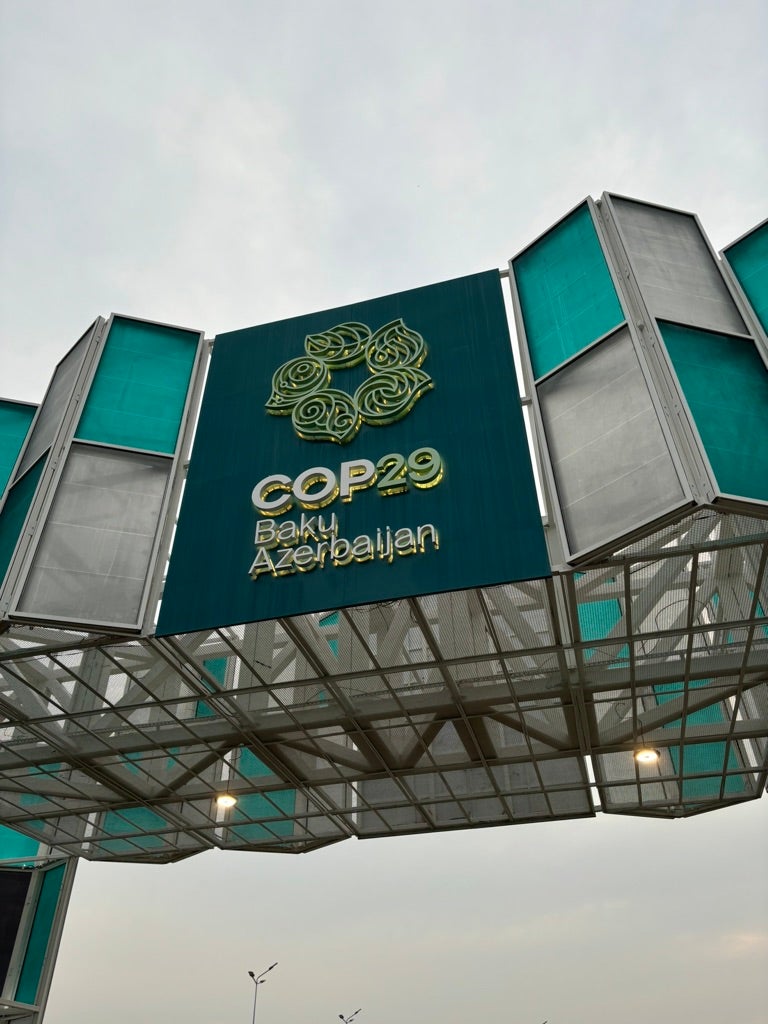
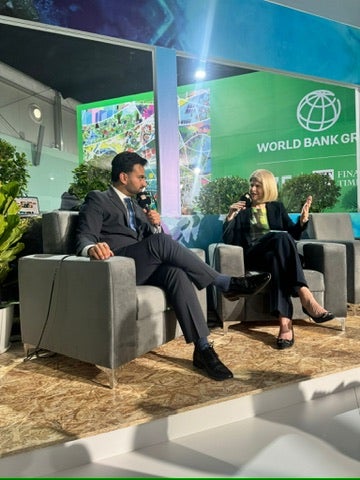
Anna, Zach and Kamal left with a deeper understanding of the complexities and urgency of international climate diplomacy. Their firsthand experiences at the conference not only provided invaluable insights into the mechanics of global negotiations but also highlighted the critical role that finance plays in driving real climate action. The opportunity to engage with world leaders, negotiators and experts at COP29 has strengthened their resolve to continue pursuing careers at the intersection of climate, diplomacy and international development. As they move forward, the lessons learned in Baku will undoubtedly influence their work to address climate change and support vulnerable nations in their transition to a sustainable future.
